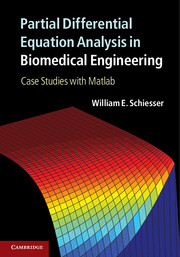Book contents
- Frontmatter
- Contents
- Preface
- 1 Introduction to partial differential equation integration in space and time
- 2 Antibody binding kinetics
- 3 Acid-mediated tumor growth
- 4 Retinal O2 transport
- 5 Hemodialyzer dynamics
- 6 Epidermal wound healing
- 7 Drug distribution from a polymer matrix
- Appendix 1 Origin of convection-diffusion-reaction PDEs
- Appendix 2 Stiffness and eigenvalue analysis of ODE systems
- Index
- References
1 - Introduction to partial differential equation integration in space and time
Published online by Cambridge University Press: 05 December 2012
- Frontmatter
- Contents
- Preface
- 1 Introduction to partial differential equation integration in space and time
- 2 Antibody binding kinetics
- 3 Acid-mediated tumor growth
- 4 Retinal O2 transport
- 5 Hemodialyzer dynamics
- 6 Epidermal wound healing
- 7 Drug distribution from a polymer matrix
- Appendix 1 Origin of convection-diffusion-reaction PDEs
- Appendix 2 Stiffness and eigenvalue analysis of ODE systems
- Index
- References
Summary
Introduction
The analysis of biomedical systems using mathematical models expressed as partial differential equations (PDEs) is the central theme of this book. This is done not with mathematical analysis such as theorems and proofs, but rather, through example applications to illustrate computational methods for the numerical solution of the model equations, and the details of implementing these numerical methods in computer codes. Example applications are taken from the recent literature: antibody binding kinetics, acidmediated tumor growth, retinal O2 transport, hemodialyzer dynamics, epidermal wound healing, drug distribution from a polymer matrix. Each chapter covers a self-contained example.
The numerical solution of the model equations is through a single, well-established procedure for PDEs, the method of lines (MOL), which has been applied to all of the major classes of PDE (parabolic, hyperbolic, and elliptic). Basically, the spatial derivatives in the PDEs are replaced with algebraic approximations; in the present book, the approximations are finite differences (FDs) although other approximations could easily be accommodated within the MOL format, e.g., finite elements, finite volumes, spectral methods, Galerkin methods such as collocation. The final result is a set of routines that implement the MOL calculations for each particular application; the format of these routines is the same throughout the set of applications.
Information
- Type
- Chapter
- Information
- Partial Differential Equation Analysis in Biomedical EngineeringCase Studies with Matlab, pp. 1 - 147Publisher: Cambridge University PressPrint publication year: 2012
